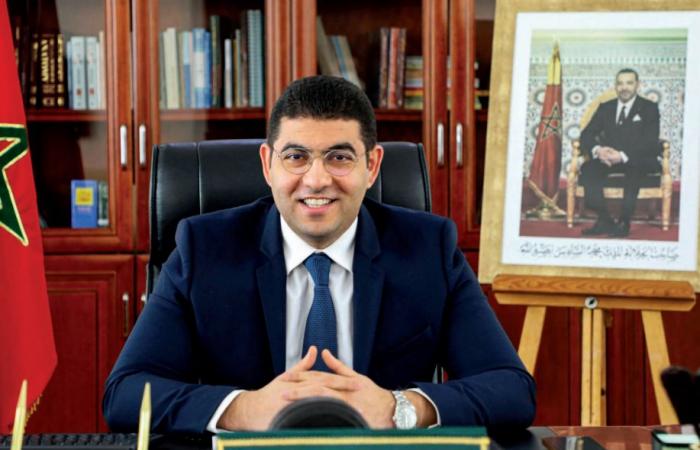Finances News Hebdo: First of all, what areas of collaboration is the Ministry of Culture planning with the sports and tourism sectors to transform CAN 2025 and the 2030 World Cup into showcases of Moroccan heritage on an international scale? Mohammed
Mehdi Bensaid: Above all, we must remember that our country has had a coherent and integrated cultural policy for several years. In the wake of the high directives of His Majesty King Mohammed VI, may God help him, the ministry has deployed public policies which aim to put culture at the heart of our public space. Highly prestigious events like the CAN or the World Cup are showcases, indeed, but cultural work precedes them, and will continue afterwards. Our collaborations with our institutional and private partners are dense, and concern all areas. For example, we are going to generalize the youth pass, which allows access to various integrated services, such as sports equipment, transport, accommodation and cultural facilities. This facilitation of travel for our young people, as well as access to museums and heritage sites, is a strategic instrument in our desire to accustom the young public to discovering their culture and heritage, alongside sporting or fun activities. This type of combination between sport, culture and leisure can then be generalized to foreign audiences.
Video games and eSports in particular are increasingly present within infrastructures dedicated to young people, alongside our programs aimed at creating an industrial ecosystem dedicated to eSports, through trade fairs, a gaming city, etc. CAN 2025 and the 2030 World Cup will be ideal opportunities to show Morocco’s progress in this area which is at the crossroads of sport, the cultural and creative industry and youth leisure. It will also be an opportunity to interest young Moroccans in this field which is booming worldwide, and where Morocco has a place to seize. Furthermore, exhibitions, festivals and other cultural events which will take place during sporting events can be harmoniously arranged to welcome new audiences. Finally, our concerted programs with civil society and private sector operators, such as the 150 cinema theaters program, currently being deployed, will contribute to diversifying an increasingly mature cultural offering.
FNH: To what extent will festivals, exhibitions and other cultural events be integrated into sporting events to offer visitors a complete immersion in the cultural wealth of Morocco?
M. M. B. : Our country today has a very rich cultural events offering, which takes place throughout the year, and in the different regions of the Kingdom. The international sporting events organized by our country have benefited from this offer for several years. And during the next major events such as CAN 2025 and the 2030 World Cup, these different festivals will be there, as well as other future events which are being programmed, either by the various authorities or by society. civil society itself, which is very active in this area, through associations, foundations and other types of structures. At the ministry, our policies aim to facilitate the broadcasting of these events, the circulation of different audiences, the connection between sports audiences and those of culture, through Passes, dedicated sites, integrated offers which give see the cities which host the matches in their entirety, with their heritage dimension, alongside their sporting dimension.
FNH: Is the ministry planning a rehabilitation or modernization plan for cultural infrastructure, such as museums and historical sites, to support the influx of tourists expected during these major events?
-M. M. B. : Efforts to rehabilitate and modernize cultural infrastructures did not wait for these sporting events. We have undertaken extensive and comprehensive programs to rehabilitate our cultural heritage, as well as infrastructure dedicated to culture and youth. However, the influx of tourists expected from these sporting events must be both an opportunity to make our sites and our infrastructures better known, both to foreign tourists and to our national public, but also a consecration for our sites, which are now on the threshold of an era of maturity, where we must learn to manage a cultural offer which will potentially attract millions of visitors from all over the world, accustomed to a very competitive global tourist offer. The excellence of the Moroccan cultural offer must seize this opportunity to show our ability to now place itself at the top of the cultural and artistic tourism offer.
FNH: What strategy will the ministry deploy to highlight Moroccan intangible heritage – gastronomy, crafts, traditions – and thus complete the discovery of the country’s architectural and historical jewels?
M. M. B. : Among our programs, the Nostalgia events, which take place in different heritage sites, aim to move away from the logic of “silent heritage”, and to give our sites and monuments a voice, a living story that speaks to different audiences, young people and less young people, nationals and adults. In the same vein, we want to highlight our living heritage and our intangible heritage, through different activities, or by supporting what civil society, the private sector and the regions are already doing. With the same ambition: to provide a “Moroccan cultural experience”. In this sense, the role of the cultural and creative industries and the instruments for promoting heritage will have an increasing place.
FNH: How will artists, artisans and local actors be involved in the promotion of Morocco during CAN 2025 and the 2030 World Cup, in order to guarantee an authentic and inclusive representation of our culture?
M. M. B. : The ministry places great emphasis on consultation and in-depth and permanent dialogue with stakeholders in the cultural sector. The CAN and the World Cup, like other events, will be an opportunity to mobilize different energies. But I remind you once again that we deployed this approach to dialogue well before these sporting events, and we will continue it. Our artists, artisans and cultural operators, like our athletes, are committed to this Moroccan cultural ambition. Our role is essential: technical support and facilitation.



